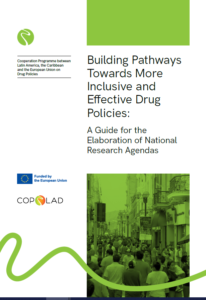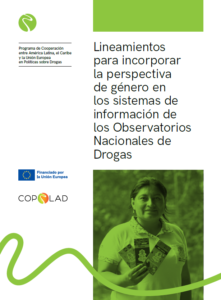What institutional, human and financial resources do the National Drug Observatories have at their disposal to consolidate their national research and information systems? How can they ensure that drug studies take into account the specific characteristics of women, men and gender diversity? How can they focus on social groups that are not visible? What does it mean to include a rights-based approach in drug research?
These questions guided the work of strengthening the NDOs that the European cooperation program on drugs, COPOLAD III, is carrying out with the LAC NDOs. Within this framework, a first objective achieved was the elaboration of these four conceptual and methodological guides aimed at the NDOs to strengthen their role in the coordination and production of national research on drug problems, incorporating rights and gender perspectives.
The contents of the guidelines were presented to all the NDOs at the Lisbon meeting last May and will be the reference for COPOLAD’s technical assistance to the NDOs in different lines of work, which was launched on September 5.
After a process of final revision, translation and editing, we are in a position to make the public launch of the guides, in Spanish and English, for the benefit of a wider public.

The document addresses the conceptual definition of resource mapping and its objectives, a description of its functions, basic characteristics, requirements, operational mechanisms and other key areas. And the steps necessary to carry out resource mapping, which each National Drug Observatory (NDO) will have to adapt according to different contexts.
Key questions guiding the process and the identification of stakeholders comprise the core elements of this section. Finally, the third section contains a guide on how to form a Scientific Advisory Committee to strengthen NDOs in decision-making on methodological and scientific aspects.
Guidelines for incorporating the gender perspective
The Guide addresses the importance of incorporating this perspective into drug research and information systems, emphasizing the positive effects this has on how to define and address the problems to be investigated.
The third section briefly compiles the regulations that promote the incorporation of this approach in the production of data and studies on drugs. The fourth section reviews some methodological aspects for incorporating the gender perspective into drug information systems. Finally, the fifth section proposes possible new lines of research on drugs with a gender perspective, suggesting relevant problems and possible methodological strategies for each one.
Guide for the development of national agendas
Drafting a national drug research agenda presents several challenges, such as the need to use diverse methods to support the process of defining research priorities, considering the existing problems, the populations affected, the conceptualizations that the different actors have regarding the problems to be addressed, and the resources available to carry out the plan. The establishment of research priorities is essential to improve drug policies, especially if legal and gender perspectives are incorporated into the definition of drug problems. Effective coordination and avoidance of duplication of efforts optimizes resources and ensures that studies are relevant and effective. However, there are often gaps between research and policy, attributable to weaknesses in communication and a lack of connection between disciplines in drug policy.
Guide to apply the differential and rights approach
This guide seeks to delve into what the rights-based approach entails from a conceptual point of view, as well as what it entails to integrate it into public policies on drugs in terms of research and data collection that can then support evidence for policy practice.







